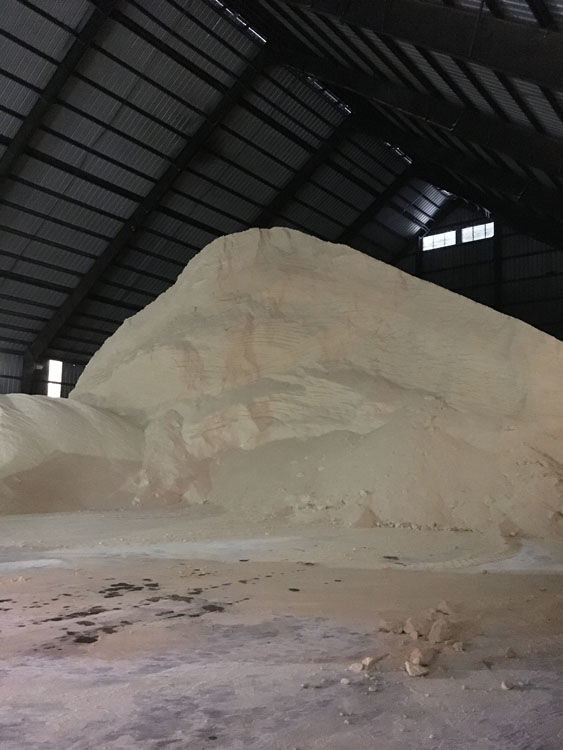Sweetening The Deal
Published 7:00 am Tuesday, September 19, 2017

- Sweetening The Deal
Acadiana Sugar Cane Mill Success
By Patrice Doucet
Trending
This fall, rural landscapes throughout Acadiana are changing, as lush sugar cane fields are neatly barbered to look new again. Trucks and tractors will haul loads of stalks up and down country roads and highways to the sugar mills and the air will bring waves of the sweet, sour smell of burnt cane shucks. For the next three months, sugar mills will be working non-stop to process Louisiana’s sweet commodity, and one mill, in particular, is excited about the prospect of a good harvest year.
Cajun Sugar Company, LLC in New Iberia is one of 11 surviving mills in Louisiana that perhaps knows better than most about staying afloat against all odds. The company evolved in the fall of 2016, when the former Cajun Sugar Co-op was going out of business due to a declining cane supply. Stakeholders thought the move to become a privately owned company would assure a more reliable, affordable processing facility with the potential for additional income.
In September of last year, the company became the first, and is still the only, sugar mill in Louisiana owned by growers. Forty-four growers, from Iberia to Bunkie, now own 70 percent of the LLC, with 15 percent co-owned by Cajun Sugar President Craig Caillier and the remaining 15 percent by Louisiana Sugar Cane Cooperative in St. Martinville. As majority owners, the growers vote at the annual growers meeting and elect the board of directors. They are also entitled to dividends for the sugar produced.
“The growers having direct ownership help stabilize the cane supply,” says the mill’s General Manager Mike Comb. “They’re more likely to stay at the factory and there’s better opportunity to grow the supply because you’re giving them ownership – they have a bigger interest in its success.”
Rob Judice, Jr., a seventh generation sugar cane farmer in Loreauville who has been involved with Cajun Sugar Co-op since 1993 and is currently on the board of Cajun Sugar Co., has seen the positive effects of a grower-owned company. “The company is run more like a business,” he says, “when things need to be done to benefit the company, decisions are now made based on the company moving forward instead of considering factors that shouldn’t weigh in. Last grinding season, I saw a commitment that I’ve never seen before. Everyone finished grinding at the same time; there were no slowdowns until the last ton went through the mill – because they had a stake in the company’s success.”
In its first year of operation, the new Cajun Sugar processed 958,000 tons of sugar cane, an increase from the troubling prior year’s 535,000 tons
Trending
“We’re getting back to where the Co-op was in better days and we’re going to grow it from there,” says Comb. He cites company president Craig Caillier as the main driving force of maintaining the mill’s previous cane supply and acquiring new supplies. “Craig had a following of growers who trusted him from his days as CEO at MA Patout & Son in Jeanerette, and they saw the potential in the new company.” Perhaps the best demonstration of grower trust in Cajun was each their signing of an unprecedented 10-year contract.
It certainly helped in the transition that all former employees of the Co-op moved to the new Cajun. In fact, Comb says a couple of additional employees were hired this year, bringing the staff to 70, including 10 supervisors, one mechanical and two chemical engineers, all with two centuries of experience in the sugar cane industry. “I can’t say enough about the workforce at Cajun,” says Comb, “they’re really a good group of dedicated people. Several have been involved with Cajun Sugar for 30 plus years.”
Technology becomes increasingly integral to the mill’s strategic survival. Jason Burke, Chief Engineer, says that Cajun Sugar is arguably one of the most automated mills in the state. “In the last 15 years, the Co-op had transitioned from localized electronic controls throughout the factory to a more centralized programmable, PLC-based system that has enhanced our ability to troubleshoot problems and tweak the process,” he says.
Other notable advancements in the mill’s efficiency include improvements in increasing sucrose extraction along with modifications to the clarification and filter station aimed at reducing sugar loss. Burke says the mill has also been strong in boiler capacity for some time now, lowering the cost of operation. “We’re making sure that we have enough efficiencies in the factory to increase our yield of sugar,” adds Comb. He says a partnership between Louisiana Sugar Refining, which buys and refines Cajun Sugar’s raw sugar products, and Cargill Corp. will allow more precise quality control and ultimately even more efficiency. There are also plans for a new evaporator in 2018 – just part of an expansion plan for the next five years.
Plans for future growth include reaching out to more growers, particularly grain farmers, who have expressed increased interest in diversifying their crops to include growing sugar cane. “We have some awesome prospects from the Cecilia/Arnaudville area and up north in Rapides and Avoyelles Parish,” says Judice.
Comb says there is over 500,000 tons of cane currently grown in that area transported to mills here because of factory closures up north since the late ‘70’s, early 80’s. “Our goal is to gain 300,000 more tons of cane over the next three to five years,” says Comb. Helping that objective, the company’s 75-owned trucks have already picked up approximately 25 percent of its cane supply.
brbrbrbrbrbrbrbrbrbrbrbrbr
Cajun Sugar will begin grinding season September 27 and, facing the same unforeseen challenges as other mills, namely weather, plans to process 1 million tons of sugar for the 2017 harvest, making about $60,000,000 in gross sales of sugar and molasses, with much of it staying in the Acadiana area, according to Comb. For those at Cajun Sugar Co., the smell of bagasse (sneered by many) is getting sweeter every year.





